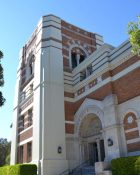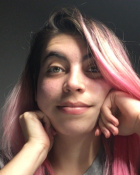
Adam Crager

Tristen Cardwell
Adam Crager is an assistant professor in the Department of Philosophy. Adam's areas of interests include Ancient Greek Philosophy, philosophical logic, and metaphysics. He was interviewed by second-year philosophy student Tristen Cardwell. She is interested in topics in philosophy of language, logic, and philosophy of mind, especially self reference and self-consciousness.
TC: Tell me a bit about your background. Where is your hometown? Have you strayed far in the course of your education, and your work?
AC: Well, I was born in Denver. Did my undergrad degree at the University of Chicago, a M.Sc. logic degree at the University van Amsterdam, and my philosophy Ph.D. at Princeton. In grad school, I was also a fairly regular visitor to the Humboldt Universitat zu Berlin. I guess I’ve moved around a fair bit. I joined the UCLA department in 2014.
TC: When and how did you first become interested in philosophy?
AC: Growing up, our parents pretty much gave us free rein with books around the house. I’d found some Freud which I thought was super interesting, and some Nietzsche which proved way harder to read than anything else I’d picked up, but somehow also seemed to be saying something really important.
Later my mom pointed me to Will Durant’s The Story of Philosophy. Like many people, I didn’t much like high school. But Denver public schools had a program where qualifying students could enroll in university courses at University of Colorado Denver. So, I enrolled in some philosophy courses through that and really enjoyed them.
TC: What are your current research projects?
AC: I basically work in three areas: ancient Greek philosophy, classical Islamic philosophy, and contemporary philosophical logic. At present, much of my research is centered around philosophical issues in the history of logic. For instance, since I take there to be a sense of invent’ and a sense of ‘logic’ on which it’s true to say that Aristotle invented logic, I’d like to understand why Aristotle thought he needed to invent logic. How was his invention supposed to advance his philosophical program? And what really was it that Aristotle did invent and took himself to be inventing? My particular approach to history of logic characteristically involves a combination of technical with more traditionally humanistic methodologies. Quite generally, I think that the history of logic is best studied in the context of the history of mathematics and the history of grammar.
TC: Are there any moments in your philosophical education that strike you as a turning point where you began to think about things differently, or ask different sorts of questions?
AC: I’ll probably be able to give a better answer to this question in 10 years or so-I’m a 2015 Ph.D. after all. But one such experience that comes to mind now is when I first studied Godel’s Incompleteness Theorem as an undergrad. That was when I first discovered that logic was not merely useful but could actually be profound.
No matter what you do after college, don’t stop reading intellectually demanding books after you graduate.
TC: What advice would you like to give to undergraduates majoring in philosophy?
AC: No matter what you do after college, don’t stop reading intellectually demanding books after you graduate.
TC: What about books in your area that would be interesting to non-specialists?
AC: There are many books in my area that I think non specialists would benefit from reading or rereading. Books I’ve recently taught in undergrad courses, like Plato’s
Republic and
Symposium, can certainly be better understood with the help of a scholar. But like much of Plato, their real target audience is thoughtful human beings rather than specialists in any sense. As far as contemporary work, one piece I’d highly recommend to students of ‘analytic’ philosophy is Stephen Menn’s (difficult, but surprisingly accessible)
Al-Farabi’s Kitab al-Huruf and his Analysis of The Senses of Being.
TC: Outside of philosophy, what do you like to do?
AC: I love many kinds of music, and love live music especially. My favorite local musician is saxophonist–and UCLA alum–Kamasi Washington. As far as hobbies go, I also enjoy juggling, reading for pleasure, and indoor gardening.
TC: Wow, juggling! What are the weirdest things you've juggled? Or what's the most difficult thing you can juggle with?
AC: Well, these days I mostly just juggle for fun. So clubs-the things that look like bowling pins–are what I mainly end up juggling. When I used to do performance in Chicago, we’d juggle things like knives and fire too. Before I left grad school, one of my friends had me juggle knives over him at a party.
TC: What kinds of things do you like to read for pleasure, that are unrelated to your research?
AC: When I have time, I really enjoy reading literature. I’ve been a huge fan of David Foster Wallace’s
Infinite jest since grad school. The best piece of new or newish literary fiction I’ve read since moving to LA is probably Elena Ferrante’s Neapolitan novels.



